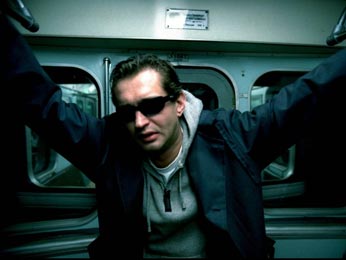Film Review
‘Night Watch’: Frenetic, Clever
Look at the ‘Big Question
By Alex Holachek
(February 27, 2006)
 I first saw Nochnoi
Dozor (“Night Watch”) in
a Moscow movie theater almost a year ago. My friends and I had decided
to see the blockbuster film after being subjected to a city-wide
publicity blitz characterized by ominous billboards portraying flocks
of ravens and a serious looking guy in sunglasses and maybe a knight
or two. I was skeptical that a film billed more or less as “the Russian
answer to The Matrix” would be bearable, let alone entertaining.
In fact, I was kind of hoping it would be cheesy enough to provide
my group of friends fodder for inside jokes that would be funny for
weeks on end (sad, I know). But I emerged from the 114-minute film
a convert to “Night Watch’s” unique brand of frenetic storytelling,
creative special effects and cleverness. So upon hearing that the
movie had made its way to Washington, I jumped at the chance to see
it again.
I first saw Nochnoi
Dozor (“Night Watch”) in
a Moscow movie theater almost a year ago. My friends and I had decided
to see the blockbuster film after being subjected to a city-wide
publicity blitz characterized by ominous billboards portraying flocks
of ravens and a serious looking guy in sunglasses and maybe a knight
or two. I was skeptical that a film billed more or less as “the Russian
answer to The Matrix” would be bearable, let alone entertaining.
In fact, I was kind of hoping it would be cheesy enough to provide
my group of friends fodder for inside jokes that would be funny for
weeks on end (sad, I know). But I emerged from the 114-minute film
a convert to “Night Watch’s” unique brand of frenetic storytelling,
creative special effects and cleverness. So upon hearing that the
movie had made its way to Washington, I jumped at the chance to see
it again.
“Night Watch,” directed
by Timur Bekmambetov, holds
up under a second viewing, and this time I’m proud to say I actually
knew what was going on. The plot is convoluted; suffice it to say
that the central conflict is between the forces of light, of which
our hero Anton (Konstantin
Khabensky) is a member, and
the forces of dark, which consist of vampires, including Anton’s
next door neighbor and a Russian pop star. The truce that has kept
the opposing sides from destroying each other is beginning to unravel
in present day Moscow, and the future depends on which side a certain
boy chooses to join. It all sounds terribly derivative here, but
the fun lies in the unique way the story is told.
The Night Watch, a group of “good guys” patrolling
the assorted “bad guys,” issue licenses to vampires who need a blood
fix, and fill out voluminous paperwork to report infractions against
the truce. The film’s nods to reality, including a scene in which Anton’s
backup team is frantically driving around, trying to find him with
inadequate directions (“Do you know how many number twelves were on
that street?” the driver later asks him with irritation), are what
anchor the movie and prevent its elaborate mythology from becoming
silly.
Another point in which the film manages to keep its
dignity intact is with regard to special effects. The movie looks great
despite having been made on a budget that seems puny by Hollywood standards
(about four million dollars, a huge sum in terms of Russian cinema).
Special effects are not deployed haphazardly, and thus the movie keeps
from diluting the wonder of scenes such as the one in which a bolt
rattles loose from a plane and begins a long descent, finally coming
to rest in a teacup. And in a particularly engaging twist, the subtitles
interact with the story, fading in and out, growing and shrinking,
and blinking or taking on a red hue for emphasis.
The sizeable cast, including many
well-known Russian actors, works well and manages to integrate the
action and comedic
aspects of the film. I was especially partial to Khabensky’s character,
who updates the familiar long black coat/sunglasses combo by accessorizing
with a beat-up hoodie. And as for the movie’s other similarity to “The
Matrix,” the inevitable Big Question (in “The Matrix” I think it was
something about reality, but I’m not completely sure) here there is
some low key and completely fitting rumination on what makes the good
guys, who sometimes must do distasteful things in pursuit of their
ends, so much inherently better than the occasionally sympathetic bad
guys. But don’t worry, such matters are not pondered at the expense
of vampire-fighting and trucks flipping over people’s heads and cool
stuff like that. Just be prepared to leave the theater bereft of any
good inside jokes.
“Night Watch” is playing at Landmark
E Street Cinema in Washington, DC.

